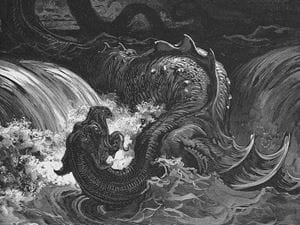
Modern culture has a bizarre ability to turn ancient stories that should be gripping tales of courage and betrayal into complete snooze fests. The heroic tale of Beowulf has had high school students across the nation dozing off and, prior to a resurgence of interest following Rick Riordan’s wildly successful “Percy Jackson” series, classes that discussed classical mythology were filled with teenagers counting the minutes until the bell rang. The Bible has received similar treatment. Oddly enough, however, the tales of the Bible have had it even worse due to their association with religion. Youngsters and adults alike who do not enjoy church or see Christianity as uptight and stuffy assume that the Bible is filled with more of the same. In reality, the Bible is filled with tales of heroic battles, deadly coups, dangerous love and frantic escapes. The language may be different from what modern readers are used to, but the actual stories in the Bible should be as exciting as any action movie. Modern movie heroes tend to be facing down a few wicked men with guns in order to save or avenge loved ones. Biblical heroes were battling the Roman and Assyrian empires, both of which were known for inventing and perfecting torturous methods of murder, for nothing less than the survival of their people and the salvation of the human race. The best known moment in the New Testament focuses on a full Roman crucifixion. How can this be considered boring?
There is no doubt that the overarching story and larger tales in the Bible are enough to wow anyone who is paying attention. That said, there are some incredible details that sometimes get lost in the larger story. Here are six commonly forgotten biblical details that only make the Bible more incredible.
The Garden of Eden is guarded by an angel with a flaming sword.
Most people know the story of Adam and Eve. Even non-Christians are familiar with the basic story of a snake tricking a man and woman into eating a fruit commonly misconstrued to be an apple. What most people are not aware of is what happens after God gives Adam and Eve the boot and kicks mankind out of the Garden of Eden. In order to, presumably, keep them from trying to sneak back inside, God puts an angel on guard. Said angel is carrying a flaming sword. It suddenly makes a lot more sense why early European explorers were actually concerned about stumbling across the Garden of Eden. The spiritual consequences of a sinner trying to enter paradise aside, there was an angry angel with a sword on fire waiting to smite trespassers.Ehud assassinates Eglon, King of Moab.
For some reason, many people seem to be under the impression that the Old Testament is composed of Genesis, Exodus, Isaiah and the long lists of laws found in Deuteronomy, Numbers and Leviticus. Oh, with David and Daniel thrown in there somewhere, too. While there are certainly long lists in the Old Testament, both of laws and the specifications for building and rebuilding the Temple, there are also many stories of court intrigue, war and the Israelite’s battle for survival. One of those stories that is often forgotten is that of Ehud. Ehud was a clever Israelite who got close to the Moabite king by pretending to have a very important secret message and then killed him. Ehud escaped with no one any wiser and led the Israelites to victory. This upstart Israelite belongs in an action movie somewhere.Jael kills Sisera.
The book of Judges is filled with stories of the Israelites being attacked by their enemies and a leader rising up to help save their people. One of the most unexpected saviors comes in the form of Jael, the wife of Heber the Kenite. Following a defeat at the hands of the Israelites, Sisera flees to the house of Heber. Herber’s wife, Jael, pretends to be sympathetic to Sisera. She then murders him in his sleep. The apocryphal book of Judith contains a similar story involving a woman named Judith and an Assyrian commander. Only Judith actively hunts down the commander rather than waiting for him to come to her.The Leviathan.
The Leviathan is one of those things that has passed from religious writings into the sphere of popular imagination. Most secular depictions of the Leviathan, however, do not even come close to matching the terror of the original description of this terrible creature. According to Christian legends outside the Bible, the Leviathan was God’s most impressive creation. He realized later that the pair of creatures would end up killing and eating everything else on Earth. In order to save the rest of the world, He killed one of the creatures. He made the other immortal, however, to preserve His ultimate design. Given the description in Job, it is not hard to imagine a pair of these creatures laying waste to creation. One certainly sounds intimidating enough. According to Job, the Leviathan is known for “its strength and its graceful form” with an “outer coat” made of a “double coat of armor” with a maw “ringed about with fearsome teeth” and a back covered in “rows of shields tightly sealed together; each is so close to the next that no air can pass between.” The Leviathan’s “snorting throws out flashes of light; its eyes are like the rays of dawn. Flames stream from its mouth; sparks of fire shoot out. Smoke pours from its nostrils as from a boiling pot over burning reeds. Its breath sets coals ablaze, and flames dart from its mouth. Strength resides in its neck; dismay goes before it. The folds of its flesh are tightly joined; they are firm and immovable. Its chest is hard as rock, hard as a lower millstone….The sword that reaches it has no effect, nor does the spear or the dart or the javelin. Iron it treats like straw and bronze like rotten wood. Arrows do not make it flee; slingstones are like chaff to it. A club seems to it but a piece of straw; it laughs at the rattling of the lance. Its undersides are jagged potsherds, leaving a trail in the mud like a threshing sledge. It makes the depths churn like a boiling caldron and stirs up the sea like a pot of ointment.” Try to picture that coming to munch on someone and then try to pretend the Bible is boring.Paul avoids a scourging.
The Roman Empire had a talent for taking already horrendous punishments and turning them into a mastery of agony and horror. Rome, for example, was not content with merely flogging troublemakers. Instead, Rome would have them scourged. Many modern readers of the Bible assume that scourging is either another word for whipping or a slightly more severe version of a flogging. Scourging, however, could easily kill a person. When a person was scourged, the Romans used a special whip called a flagrum. The flagrum was a multi-stranded leather whip with shards of glass, bits of bone and pieces of metal tied into in and lead weights on the end. It was more than capable of shredding flesh and muscle alike, and there are reports of people who were scourged being inadvertently disemboweled when the flagrum wrapped around their body and ripped their stomachs open. This is what was awaiting Paul when he was taken to be flogged. Paul, however, scared the official senseless when he told them he was a Roman citizen. Roman citizens had very different rights than those living in what were, essentially, occupied territories. In one sentence Paul went from facing horrendous torture to having the upper hand.Chaining Satan for 1,000 years.
The entire book of Revelation could pretty much be listed as being an awesome detail from the Bible. There is so much going on in the book, and there are multiple layers of meaning packed into each verse. One event that people do not seem to fully appreciate, however, is the chaining of Satan. It is true that the measure will be temporary, the Devil will eventually escape in time for the final battle between good and evil, but the fact remains that Satan will be chained up and trapped for 1,000 years. During that time, he cannot continue “deceiving the nations…until the thousand years were ended.” So, there will be 1,000 years, essentially, without temptation. That is a time period worth talking about.Despite its occasional reputation for being boring, the Bible is filled with stories of heroes and intrigue in equal measure. The nation of Israel, after all, has forever been the perpetual underdog that larger powers wanted to destroy. Still, the Jewish people endured. Their heroes went down in history as some of the greatest men and women of all time to the point that, thousands of years later, people today still know their names.

